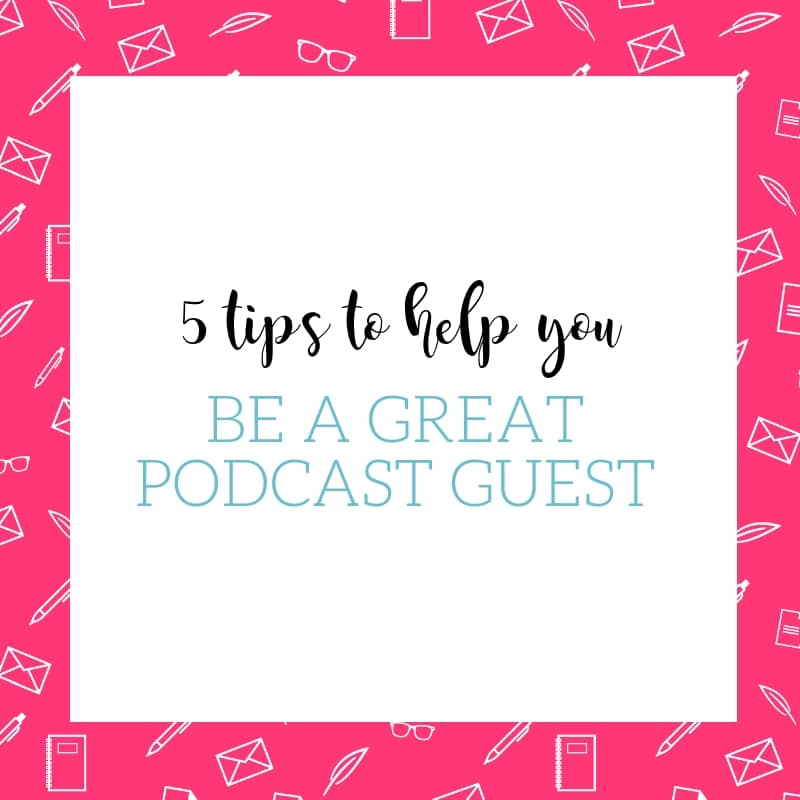Being a guest on podcasts can be great for your small business. It can help you build brand awareness and (depending on the show) may even allow you to pitch your services or product. If you target the right podcast, you can get your name in front of your ideal customer and have them pay much closer attention than they would to any ad you might buy.
There are plenty of guides out there to help you determine which podcasts to pitch, and how exactly to market yourself to the hosts as a potential guest. If you’ve followed those tutorials and lined up some podcast appearances, that’s great news. But it may also be a bit terrifying if you’re new to being interviewed. You may be worried about sounding like a blubbering idiot.
Fear not. As a journalist who has conducted thousands of interviews, I’ve learned a lot about how to talk to the media (or, in this case, a podcast host). Oh, and now that I host a podcast of my own, I’ve really learned what makes a guest great. Here are five things to do to make sure you’ll be a memorable (for all the right reasons) podcast guest.
1. Be Prepared
Do your research on the show and its hosts well in advance of your appearance. What’s the format? What types of questions do they tend to ask? Do they like you to use a lot of real-life examples? Do they like stories or do they prefer a focus on takeaway tips? How long is the show? How much self-promotion do they allow? Knowing all of this in advance will help you prepare and organize your thoughts so you don’t trip over your words. Use what you learn to create talking points that you can keep nearby during the interview in case you suddenly lose your train of thought.
2. Practice, Practice
Choose a few points you want to make, and come up with answers to the types of questions you’re sure to be asked (if the hosts give you questions in advance, even better). Again, write these down on a cheat sheet that you can turn to during the interview if you feel lost. In advance of your appearance, consider doing a few Facebook lives (or, if you’re camera shy, record yourself on your phone or computer without an audience). This can help you get more comfortable talking on cue, and also gives you the opportunity to go over your talking points several times so you know them well. The point isn’t to memorize, but you do want to be so well-versed in your content that you can speak off the cuff about it confidently without fumbling.
3. Check Your Tech
If you’re being recorded via phone, do the interview in a place where you have reliable service and reception. If the show is recorded using an online platform (Skype, Google Hangouts, Zoom), make sure you have a stable Internet connection. You don’t have to buy a fancy microphone, but make sure you have headphones with a built-in microphone. Also, don’t allow the mic to rub your hair, clothing, or jewelry during the recording (this creates a very distracting sound). Find a quiet room that doesn’t echo to do the interview (pro tip: closets are usually great for this). Also, ask in advance whether you’ll be on camera. If so, think about where you’ll film. Choose a space where you have light in front of you, not behind you. Choose a background that isn’t too busy and distracting. Wear a simple shirt, do your hair and makeup, and check yourself on Skype or Google Hangouts to make sure you’re happy with how it looks before you film.
4. Speak Slowly
Everyone tends to talk a lot faster than they realize, and it gets even worse when nervous. When we talk too quickly, we’re more likely to stumble over our words and use filler words like umm and uh. Make a conscious effort to slow down during your interview. Remember to breathe and talk very purposefully. You’ll be much happier with the results when you listen back to your appearance later. If you think you’re talking too fast, you definitely are. If you think you’re talking too slow, you’re probably doing well.
5. Follow Up
After the interview, email the hosts to thank them for having you on the show. Also, send along social media handles, photos, or anything else they requested (or anything you may have referenced during the show, such as links to a course or opt-in). Finally, don’t forget to ask when your episode will air and if they’ll be sending you anything to help promote the show. If they do send graphics and copy, be sure to do your part to promote the show when it airs. A killer podcast appearance can have myriad benefits for your business. A little advance prep and following these five strategies can help ensure you get your guest spot right.




In my work as a transcriptionist I’ve heard a lot of podcasts, good and bad. If you’re connecting over an internet connection and not a phone connection, put double effort into speaking slowly in case of glitches or connection lag 😉